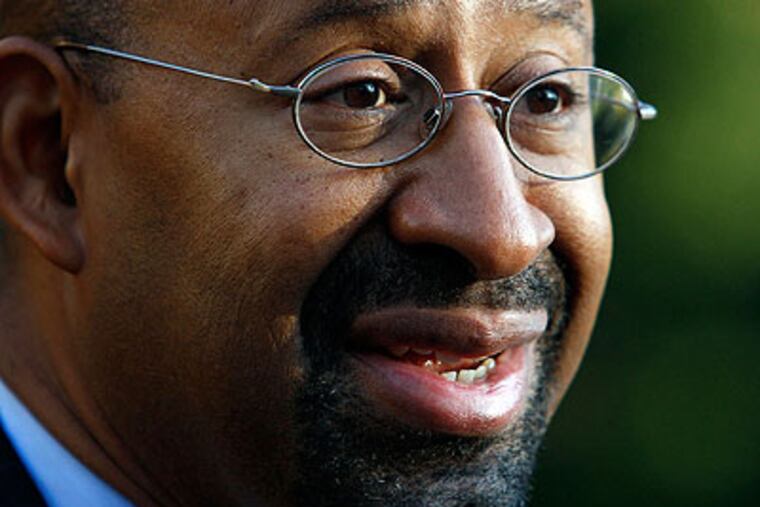Nutter secures second term
Mayor Nutter swept to a second term Tuesday, easily besting Republican Karen Brown by 3-to-1 ratio.

Mayor Nutter swept to a second term Tuesday, easily besting Republican Karen Brown by 3-to-1 ratio.
With more than 80 percent of the precincts counted, Nutter easily trumped his GOP rival Brown and independent candidate Wali "Diop" Rahman.
Introduced by his teenage daughter Olivia to the crowd of several hundred at the Radisson Warwick Hotel, Nutter said, "It is with great pride and humility that I say thank you. Tonight is not a night for satisfaction but for impatience. . ..We have in fact begun the renaissance of this great city, but we're not done yet."
When asked about capturing 24 percent of the vote, Brown said, "It says Michael Nutter should start listening to the little guy. We ran this race with no support, no money - not even from our own party - and we pulled this off."
Rahman, who won about 3 percent of the vote, called his campaign, "a victory for the people."
"Our campaign raised the issues and concerns of the masses of Philadelphia, particularly the historically oppressed black and Latino communities," Rahman said.
Now comes the hard part for Nutter.
As a second-term mayor, Nutter must build his legacy even as his power erodes and shifts to those likely to run for his job in 2015.
Nutter, 54, has laid out formidable goals for the next four years. He wants to improve the city's beleaguered school system and boost residents' educational levels, overhaul the inequitable property-tax system, reduce black-on-black violence and attract more jobs.
The Philadelphia School District's problems mirror the city's. Most students are poor, state and federal cutbacks forced $629 million in budget cuts this year, and violence is a big problem in some schools.
The mayor cites progress, including high-school graduation rates that have risen from about 55 percent to 64 percent in the last four years.He also believes his new appointments to the School Reform Commission will improve leadership there.
Activist Helen Gym, a founder of Parents United for Public Education, however, wants to see the mayor do more.
The city plugged the last two school-budget deficits with property-tax increases, and Gym thinks that solution is unlikely to fly with voters again.
"The mayor needs to think about a longer-term plan to generate additional revenue for the schools," Gym said. Nutter spokesman Mark McDonald said the mayor would work with other government officials to explore new sources of school revenues.
In his first term, Nutter pushed through reforms to modernize the city's antiquated and politicized property assessment system. But the hard work of reassessing all city properties and sending new bills to residents remains to be done. Some critics accused the mayor of putting off the reassessment - which is likely to inflame voters whose tax bills rise - until after the election.
Nutter says the work simply takes a long time. New assessments will be out next year, he said, promising to seek relief for low-income property-owners so that their bills do not rise dramatically.
"First we need to fix it, then we need to be able to look at everybody in the eye and say we can get you a fair, accurate and equitable assessment notice," Nutter said in a preelection interview.
Of Nutter's many goals for this term, he seems most passionate about reducing gun violence among African American men. He has been circumspect about his exact plans other than a commitment to go after illegal guns and coordinate actions with federal and state authorities and the district attorney. Joan Bauer, 77, a retired administrative assistant who lives in Center City, was among thousands of optimistic Philadelphians who swarmed City Hall in January 2008 on Nutter's first day of work.
The economic downturn thwarted some of her hopes for the mayor, but she still shares his concerns. She said black-on-black violence is the issue she hopes he does something about. She is shocked that so many people seem to ignore the problem.
"If we were in the city and (these victims) were all white, there would be an uproar," Bauer said.
Creating jobs has defied most politicians, especially in this economy. Some economists think there is little state and local governments can do to get people working again.
Paul Levy, chief executive of the Center City District, which works to improve that part of town, said he wants to see further reductions in the business privilege tax (City Council, backed by Mayor Nutter, reduced those levies for new companies recently) to make it less costly to operate in Philadelphia.
Nutter spokesman McDonald said further reductions to the wage tax and some business taxes in 2014. Nutter would prefer even larger reductions, but has limited choices, McDonald said.
Levy said he also expected Nutter to start thinking about a physical legacy, possibly a new construction project that will symbolize their work. For Mayor Street, that was the South Philadelphia stadiums.
Nutter pointed to the expansion of the Convention Center and said he wanted to focus further efforts on improving the Delaware River. He also said residents can expect more development on North Broad Street, which recently announced construction of a new home for the School of the Pennsylvania Ballet.
Nutter also wants minority business owners to aim beyond merely participating in contracts.
"I want to see a hotel built in this city by a black company, owned by African-Americans and other minorities," Nutter said. "This is where you get into real economic participation. Working somewhere is great. Owning something is better."